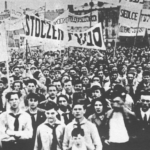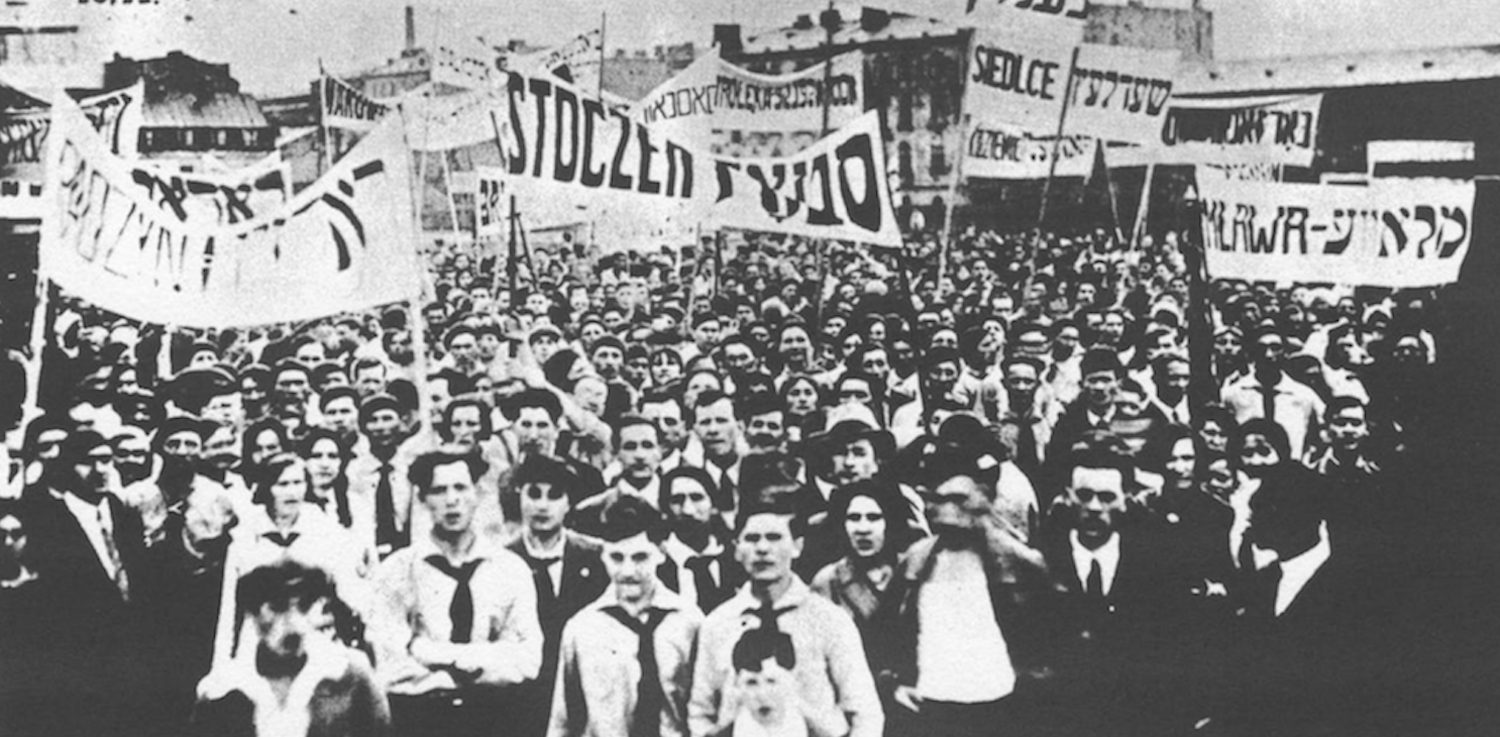The Socialism of the Jewish Labor Bund


The Jewish Labor Bund, from its beginning, described itself as a Marxist, revolutionary party, wanting thus to place itself in the camp of those opposed to the reformist tendencies in the world socialist movement. The Bund believed the overthrow of the czarist autocracy and the establishment of a socialist order could not be achieved by the gradual reform of the existing capitalist system and would require a revolution.
In practice, however, the Bund strove unremittingly to make the lives and working conditions of the Jewish workers better. The Bund did not believe in the dictum, “The worse, the better.” The Bund organized to make things better before the revolutionary moment came. In the meantime, it struck, demonstrated, and struggled to improve the lives of the Jewish workers.
In the years leading up to the founding of the Bund in 1897, and in the years following, the conditions of the working class in the Russian Empire, and later in independent Poland, were harsh. The working day was 12 to 14 to even 18 hours a day. The workplaces were squalid, unsanitary, unhealthful. Child labor was prevalent. Abuse and degradation of women, children, and laborers in general was widespread.
The Bund believed that capitalism, as Marx taught, “contained within itself the seeds of its own destruction,” that Socialism was the inevitable next stage in the development of society, a society of the democratic rule by the working class. Socialism would be a system without exploitation, a system of production for social need, and not for profit. Imperialism would come to an end, as would strife between nations, peoples, and classes. It was a beautiful dream, an ideal the Bund found worth fighting for.
But in the meantime, until that moment, the Bund organized tens of thousands of Jewish workers into trade unions, fighting to make their lives better, filling them with hope and pride, leading successful strikes throughout the Pale—strikes among the weavers of Lodz, the brushmakers of Warsaw, the leather workers of Lublin, slaughterers, coachmen, porters, and garment workers all over the Pale. Forging a mass movement, the Bund struggled against the Leninist-Bolshevik line on the one hand, and against what it conceived of as a narrow, chauvinistic, unrealistic, nationalist dream on the other.
In 1898 it was the Bund that helped organized the first Russian Social-Democratic Federation meeting from which Dan, Martov, Lenin, Plekhanov, and all the other founders and shapers of the coming Russian revolution emerged. Bertram Wolfe says the Bund at that time was “The largest and best organized body of workingmen inside the Russian empire.” In 1896, Plekhanov, founder of the Russian social-democratic movement, said, “From a certain point of view, the Jewish workers may be considered the vanguard of the labor army in Russia.”
The Bund joined the Second International in 1900, three years after its founding. It participated in the Zimmerwald Conference in 1915, seeking to end the war. After the war, the Bund did not affiliate with any International until 1930, in that year joining the Labor and Socialist International (LSI), thus once again becoming an active partner in the non-communist, worldwide Socialist movement.
Fellow socialists from the Polish Socialist Party often came to the aid of the Bund to fight off Communist thugs and Polish, fascist, anti-Semitic pogromists.
As social democrats, the Bund, except for a brief illusory moment in 1920-1921, remained in opposition to the antidemocratic, dictatorial rule of Lenin and his followers. Here are the words of a prominent leader of the Bund, Henryk Erlich (who perished in Soviet imprisonment in 1942), speaking on that subject in 1918:
Is the Soviet government a workers’ government? No! It has no right to call itself a workers’ government. It has no right to speak in the name of the Russian working class. Another revered Bundist leader, Vladimir Medem, put it this way: Socialism is the rule—the true rule, not the fictional rule—of the majority, which must in the end take its fate into its own hands. A socialism based on the rule of the minority, however, is absurd . . . [The Bolsheviks] stay in power only because their terror has destroyed and made powerless all their opponents.
And a 1924 convention of the Bund put it still another way:
The difference between us and the Communists lies in the fact that they believe in the rule by the party, and we believe in the rule by the whole working class. We say the working-class government must be answerable to the whole class; the Communists, on the other hand, say that if the working class doesn’t like the Communist Party government, the working class must still accept the will of the government and not the reverse. The chief error of the Communist Party lies in its effort to turn the might of the working class into a dictatorship of the central committee of the party over the proletariat. *
The Bund, on the other hand, was a thoroughly democratic organization. Unlike the Communist-Leninists, it believed in rule from the bottom up, not from the top down. It believed in this democratic vision not only for the inevitable socialist society to come, but for the governance of its own party. Vladimir Medem, Henryk Ehrlich, Victor Alter, Noyekh Portnoy, and the other Bundist leaders could not and did not dictate to the Bund membership. They theorized, propounded, wrote, persuaded—but they could not, did not, dictate. In 1920 Medem, their adored, iconic party leader, failed to persuade a majority at a party convention not to apply to join Lenin’s Comintern. Having failed in this, he left for America, still dedicated to the Bund, but unable to remain in a leadership position until such time, as he put it, that the Bund majority came to its senses and rejected the Leninist dictatorship, remaining true to democratic socialism. A year later, in 1921, it did just that, remaining so from that time on.
While wrangling over these large, political issues, the Bund continued its democratic brand of socialism in its day-to-day struggles to defend and improve the lives of its members by organizing, striking, and demonstrating for a shorter work week, higher pay, and, ultimately, for the dignity of the laboring Jewish masses.Warsaw Bund activist Bernard Goldstein’s memoir is full of examples of this day-to-day “practical socialism” of the Bund.
There is no better source, I believe, for getting to know what the Bund was doing day-to-day to elevate, defend, and help in a practical way the poor working-class Jews of Poland, than to follow the exploits of Bund activist Bernard Goldstein as he led Bund actions at the street level.
In his memoir (Tsvontsig Yor in Varshever Bund: 1919-1939, translated with the title Twenty Years with the Jewish Labor Bund: A Memoir of Interwar Poland), one can witness how the Bund militia fought off anti-Semitic hooligans, nationalistic Polish party thugs, and semi-fascist government police; how it fought off Communist attacks on the Bund’s secular schools, on its union meetings, its cultural events, and on the Bund’s Medem Sanitarium; one can become witness to how the Bund prevented its poor working class members from being evicted from their dark, dank slum dwellings; and more…much more.
Throughout its struggles, the Bund behaved ethically. It did not subscribe to the Communist doctrine that the ends justify the means—any means. No, the Bund believed that means corrupt ends, that the means must reflect the highest ideals of its vision of democratic socialism, that unethical, immoral means lead to unethical, immoral ends. Its leadership, and the Bund itself, was thus incorruptible, never stooping to unethical or immoral acts. This ethos was an integral part of the Bund’s socialism.
This was the socialism of the social-democratic Bund: Opposed to dictatorial Leninism-Stalinism, the Bund, had a democratic vision for a better world and carried on a courageous fight for the dignity and well-being of the Jewish working class.
As they sang, “Ver es shrekt zikh un hot moyre / Zol mit unz in shlakht nit geyn/ Yener iz a shklaf geboyrn/ Un zol blaybm in der heym…” [Whoever is frightened and afraid, Should not go into battle with us/ They were born a slave and should stay home…”]
And as the Bund’s Di Shvue [The Oath–the Bund’s anthem] put it, “Mir shvern tsu kemfm far frayhayt un rekht… /Tsebrekhn. Tsebrekhn di finstere makht/ Oder mit heldnsmut tsu faln in shlakht!” [We swear to fight for freedom and right/ To break, break the dark might/ Or fall as heroes in the fight”]
Socialist, democratic, decent, and unafraid—that is the legacy of the Jewish Labor Bund.
_________
*The above three quotes are taken verbatim from the “Translator’s Preface” to Bernard Goldstein’s memoir, “Twenty Years with the Jewish Labor Bund: A Memoir of Interwar Poland” (Purdue University Press 2016).